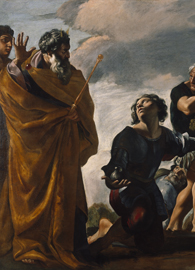Selections From Israel's Story Week 10
Spies and Lies: Numbers 13–14
By Sara Koenig
Seattle Pacific University Associate Professor of Biblical Studies
Read this week’s Scripture: Numbers 13-14
12:09

 EnlargeA Sinful Bunch
EnlargeA Sinful Bunch
There is a joke that starts with the question, “Why did it take the Israelites 40 years to get out of the desert?” Answer: “Because none of the men would stop to ask for directions.” These two chapters in Numbers give the real reason, which turns out to be no laughing matter.
Out of the many sins committed by the Israelites, two are singled out for special mention as Moses reviews the time in the wilderness in the book of Deuteronomy: (1) the worship of the golden calf from Exodus 32 (compare Deuteronomy 9:12–25) and (2) the rebellion against God after the report from the spies in this Lectio (compare Deuteronomy 1:22–45).
Here, Israel’s faithlessness reaches a new level. Here, as with the golden calf, Moses must intercede for the people so that God does not destroy them. And here we find out that the reason the Israelites wander through the desert for 40 years is that God condemns them to spend that time until all the members of the generation who were slaves in Egypt die — before the rest are permitted to reach the Promised Land.
Twelve Spies Venture In
The chapter starts with God’s commands and instructions to Moses to choose scouts from each of the 12 tribes to spy on the land of Canaan. In Numbers 13:17–20 Moses clarifies that they are to go into the desert and hill country and find answers to the following:
- What is the land like? Good, or bad? Rich, or poor?
- Are the people who live in it strong, or weak; few, or many?
- Are the towns that the people live in unwalled, or fortified?
- Are there trees in the land?
Moses concludes the list with the encouragement to them to “be bold and bring some of the fruit of the land” (13:20). So, the spies do as they are told. They return with fruit, specifically pomegranates and figs, but they also bring back a single cluster of grapes that is so large it requires two men to carry it on a pole between them (13:23). Indeed, “the season of the first ripe grapes” (13:20) is a good one in this fertile land.
That is part of the report of the spies, who return after 40 days. They show everyone the massive bunch of grapes, and report that the land is one that “flows with milk and honey” (13:27). They also answer Moses’ second and third questions — that the people in the land are strong, and live in large fortified towns. But as they give more detailed description of the obstacles, it becomes clear that the spies favor abandoning the idea of conquering the people in this land.
A Lone Voice
Caleb is a minority of one, who affirms that the land can be taken (13:30). Once he voices his opinion, the rest of the spies make their opposition even more clear. As they identify the Anakites (first mentioned in 13:28) as descendants of the Nephilim, it becomes explicit that the goal of the report was to strike fear into the hearts of the Israelites and dissuade them from entering into the land. The “great size” of the occupants of the land (13:32) has now reached primordial, even divine, dimensions. According to the NRSV, this report is described with the adjective “unfavorable” (13:32). It is, more literally, a “rumor,” suggesting that the spies are telling lies.
Still, their report has the intended effect of demoralizing the Israelite people, who cry and weep. Then they complain. Though 14:2 explains that they complain “against Moses and Aaron,” we quickly realize that these complaints are ultimately against the LORD. They question, “Why is the LORD bringing us into this land to fall by the sword?” (14:3).
Their question gets turned into a charge in the book of Deuteronomy: “It is because the LORD hates us that he had brought us out of the land of Egypt …” (Deuteronomy 1:27). By comparing these, we notice that in Numbers the complaint is not so audacious. But we also hear, in Deuteronomy, what the question in Numbers may really be suggesting. In Numbers, the people even suggest finding another leader so that they can go back to Egypt (14:4).
Moses and Aaron respond by falling on their faces (14:5), something they do five times in the book of Numbers: twice before the people (here, and in 16:4), twice before God (16:22, 45), and once before both God and the people (20:6, which will be discussed in the next Lectio).
A Minority of One Becomes a Minority of Two
Such a dramatic physical act signifies both contrition and entreaty, something that will be evident in the words Moses speaks to God later on in the chapter. Caleb and Joshua (who was also among the spies) respond by tearing their clothing as a demonstration of their grief.
Then they attempt to persuade the congregation of the Israelites not to rebel against God, not to fear the inhabitants of the land, but to remember that God is with them (14:7–9). This is to no avail. Instead of being persuaded by Caleb and Joshua, the whole congregation threatens to stone them (14:10).
Amidst all this human drama, the glory of the LORD appears — to all the Israelites. But the LORD only speaks to Moses, asking a series of questions the reader also ought to ask: “How long will this people despise me? And how long will they refuse to believe in me, in spite of all the signs that I have done among them?” (14:11). Without an answer, God threatens to destroy the Israelites and start again with Moses. Clearly, such a statement echoes Exodus 32:10, when after the golden calf incident God wanted to destroy the Israelites and make Moses into a great nation.
Another echo may be heard in the Hebrew of 14:12 — the English translations make it sound as if God is making a definitive statement, “I will strike them … I will make of you a great nation.” But the Hebrew verbs here can be understood as being in a form known as cohortative, better translated as “Let me strike them … let me make of you a great nation.” As God invited Moses to intercede for the people in Exodus 32 by saying, “now let me alone” (32:10), so also at this point God opens up the door for Moses’ intercession.

 EnlargeMoses Intercedes for the Israelites
EnlargeMoses Intercedes for the Israelites
Moses walks right through, even using similar logic by appealing to God’s reputation among the Egyptians (14:13; compare Exodus 32:12), though here he also includes the Canaanites among the nations who might misunderstand God’s power. Moses also reminds God of the promise of presence God made in Exodus 33:
[Y]ou, O LORD, are in the midst of this people; for you, O LORD, are seen face to face, and your cloud stands over them and you go in front of them, in a pillar of cloud by day and in a pillar of fire by night. (14:14)
In contrast with God’s wish to make Moses great (14:12), Moses asks that God’s power would be great (14:17).
The power mentioned here is the power to hold back from destroying Israel, also mentioned in Nahum 1:3, where it is associated with being “slow to anger.” Moses then reminds God of the way God revealed his name and attributes in Exodus 34:6–7. Though Numbers 14:18 abbreviates the full description from Exodus [see Author’s Note 1], Moses is using God’s own words and promises to ask God in 14:19 to forgive the people “according to the greatness of your steadfast love.”
God’s Answer to Moses’ Prayer
As we have seen repeatedly throughout these stories, God does as Moses asks — here, forgiving the people (14:20). But as we see in God’s subsequent words, the word “forgive” implies not the absolution of sin but the suspension of God’s anger.
The people will be destroyed, but not immediately. They will die in the wilderness — with the exception of Caleb and Joshua (14:24, 30) — and it is their children whom God will bring into the Promised Land (14:31). However, we are told that the spies —with the exception, again, of Caleb and Joshua — were struck by a plague from God and died (14:36–38).
Numbers 14:39 tells us that when Moses gives this report to the people, they mourn. On the one hand, such a response cannot be surprising. What else might you do upon hearing that you will wander in the desert until you die?
On the other hand, we note a change in tone from their usual response of weeping and complaining. In 14:40, they seem to have changed their mind about wanting to go to the Promised Land — again, not surprising, given the news of their punishment. They even acknowledge, “we have sinned.” And then they persist in their attempt to invade the land (14:44), an attempt that ends disastrously. They had feared that they would die by the sword (14:3) when they went into the Promised Land, though God was with them (14:9).
Now, despite God’s previous command that they turn around in order to avoid the Amalekites and Canaanites (14:25), and Moses’ warning that God would not be with them (14:42–43), they went, and were, indeed, defeated by the sword of the Amalekites and the Canaanites.
In addition to answering the question of why the Israelites spent 40 years in the wilderness, these chapters give us more insight into the complexity and dimensions of faith. Faith (and trust) is costly, requiring people to take risks. There is a reason why the saying is “taking a leap of faith,” not “taking a small shuffle forward.” But faith and trust can also be fragile, beaten out by fear. Despite the signs and wonders that God did among the people (14:22), despite seeing God’s glory (14:22), they tested God, disobeyed God, and refused to believe — in God’s power, in God’s goodness, in God’s provision, in God’s presence among them.
Questions for Further Reflection
- Why do the spies give the report they do about the Promised Land? Is it an accurate report? Are there examples in your own life when you acted out of fear rather than faith?
- Though God forgives the people, God still punishes them. What does that have to say about forgiveness?
- The Lectio writer describes faith as costly, risky and fragile. How have you seen or experienced that in your own life? What adjectives would you add to your own description of faith?

This work is licensed under a Creative Commons License.




